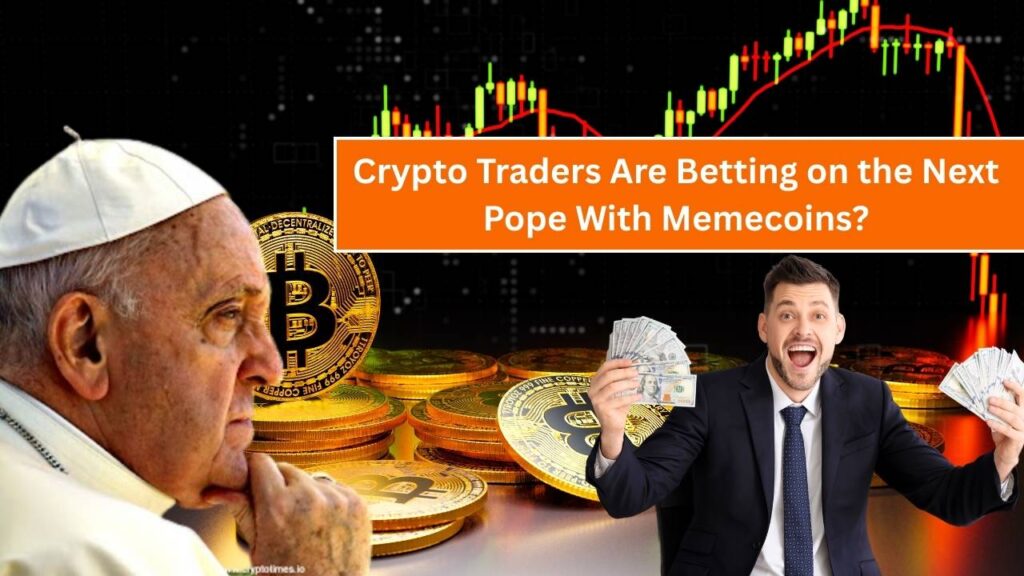Crypto Traders Are Betting on the Next Pope: In a world where cryptocurrency and internet culture collide, even the most sacred traditions are not off-limits. Recently, crypto traders have taken an unexpected turn: betting on the next Pope using blockchain platforms and meme-driven speculation. It’s a phenomenon that raises eyebrows, questions, and curiosity in equal measure.

While this might sound like satire, it’s very real. With the recent passing of Pope Francis (as reported by The Guardian), global interest has spiked not just in religious circles but in financial markets—particularly among crypto-savvy investors.
Crypto Traders Are Betting on the Next Pope
| Topic | Summary |
|---|---|
| Event | Betting on the next Pope following Pope Francis’ death |
| Platform | Polymarket, a decentralized prediction market |
| Crypto Angle | Traders use blockchain-based platforms to place bets |
| Memecoins Involved | Not directly used for betting but widely discussed for satire |
| Popular Candidates | Cardinal Pietro Parolin is a front-runner |
| Volume | Over $6 million wagered on the event |
| Ethical Debate | Concerns about trivializing religious processes |
| Official Source | Vatican Website |
The rise of crypto traders betting on the next Pope shows just how much the worlds of finance, technology, and culture have intertwined. What was once the domain of solemn tradition is now a hotbed of speculation, humor, and blockchain experimentation.
Whether you find it fascinating or offensive, one thing is clear: the future of global events will be predicted, wagered on, and memed in ways we’re only beginning to understand.
What Is Polymarket and How Are People Betting?
Polymarket is a decentralized prediction market where users can bet on real-world events using cryptocurrency. Think of it like a stock market for future events—you buy shares in outcomes, and if you’re right, you profit.
For example, traders can place bets on questions like:
- “Will Cardinal Parolin be the next Pope?”
- “Will the new Pope be elected before May 15th?”
These markets are powered by the Ethereum blockchain, ensuring transparency and decentralization. Users place bets using USDC, a stablecoin pegged to the US dollar, making transactions relatively stable compared to more volatile cryptos.
Memecoins and the Internet’s Obsession
Memecoins are cryptocurrencies inspired by internet jokes or cultural references. Popular ones include:
- Dogecoin (DOGE)
- Shiba Inu (SHIB)
- Pepe (PEPE)
While not used for papal betting directly, memecoins play a big role in the culture surrounding these events. Following the Vatican news, several meme tokens were jokingly launched to “honor” or parody the next papal election. These coins often skyrocket briefly in value, driven by community hype rather than intrinsic worth.
Why Are People Betting on a Religious Event?
At first glance, betting on the next Pope might seem distasteful. But prediction markets have a long history of being used to forecast political elections, economic trends, and even Nobel Prize winners.
Here’s why it’s happening:
- Market Psychology: High-profile, uncertain events attract speculative investors.
- Global Interest: The Pope’s identity affects over 1.3 billion Catholics worldwide.
- Blockchain Tech: Decentralized markets offer anonymity and freedom not available in traditional bookmaking.
Step-by-Step: How Crypto Traders Place Bets on the Next Pope
Step 1: Access a Prediction Market
Go to platforms like Polymarket and connect your digital wallet (like MetaMask).
Step 2: Fund Your Wallet
Deposit USDC or Ethereum into your wallet. This will be your betting currency.
Step 3: Browse Active Markets
Look for relevant questions like “Who will be elected the next Pope?”
Step 4: Place Your Bet
Buy shares in your chosen outcome. The price reflects the perceived probability (e.g., 0.65 = 65%).
Step 5: Wait and Watch
Once the event concludes, you’ll either receive payouts or lose your stake depending on the outcome.
Ethical Concerns and Criticism
Religious scholars and ethicists have voiced concerns about reducing sacred processes to speculative investments. Critics argue that:
- It commodifies a spiritual decision.
- It encourages profit from faith-based traditions.
- It risks misinformation if betting odds influence public opinion.
However, supporters claim these markets improve forecasting and democratize information by reflecting real-time sentiment.
The Data Behind the Bets
According to Coindesk, over $6 million has been wagered on papal succession markets. Activity spiked within 24 hours of Pope Francis’ passing, showing how fast the crypto world reacts.
The front-runner, Cardinal Pietro Parolin, holds the majority share of bets, indicating widespread belief in his candidacy. Other popular figures include Cardinal Peter Turkson and Cardinal Luis Tagle.
Real-Life Example
A trader known on X (formerly Twitter) as @crypto_seer shared that he turned $1,000 into $3,400 by correctly predicting the 2020 U.S. election on Polymarket. Now, he’s placing his faith (and money) in the next Pope market.
“I treat it like any other market,” he said. “Just with a lot more candles and incense.”
$5,000 in Dogecoin for Every American? 2025 Crypto Stimulus Plan Stuns Experts!
AI Models Pick the Best Cryptos for 2025: Build Your Ultimate Portfolio
Binance Community Votes 86% in Favor of Listing Pi Coin: What it Means For You?
FAQs About Crypto Traders Are Betting on the Next Pope
Is it legal to bet on the next Pope?
Depends on your jurisdiction. In the U.S., platforms like Polymarket operate in legal gray areas but are generally considered educational or entertainment-based markets.
Do you need to be Catholic to participate?
Not at all. These markets are open to anyone with a digital wallet and crypto funds.
What happens if no Pope is elected?
Bets will remain open or be refunded based on the platform’s rules. Always read the terms before betting.
Are memecoins a safe investment?
No. Memecoins are highly speculative and often lose value quickly. Invest cautiously.








